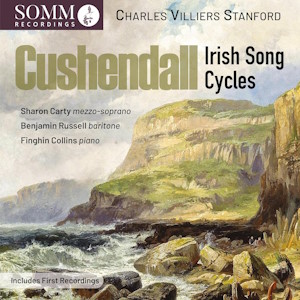
Sir Charles Villiers Stanford (1852-1924)
Cushendall – Irish Song Cycles
Cushendall, Op.118 (1910)
A Fire of Turf, Op.139 (1913)
A Sheaf of Songs from Leinster, Op.140 (1913)
Blarney Ballads (1886-1893)
Two Songs from Shamus O’Brien, Op.61 (1896)
Sharon Carty (mezzo soprano)
Benjamin Russell (baritone)
Finghin Collins (piano)
rec. 2023, The Menuhin Hall, Stoke d’Abernon, UK
Texts included
SOMM Recordings CD0681 [81]
Stanford collectors should know there are first recordings here. Cushendall, the cycle that gives its name to this disc, is one and then there are the three Blarney Ballads and the two songs from Shamus O’Brien. Of the remainder Stephen Varcoe and Clifford Benson recorded A Fire of Turf for Hyperion twenty-five years ago as well as a few of A Sheaf of Songs from Leinster, all six of which were recorded by Bernadette Greevy and Hugh Tinney.
Gentlemanly reviewers on this site will have more even-handed responses, I’m sure, but when one thinks what Janáček was doing at the time Stanford was writing these songs, one rather despairs at the Irishman. Cushendall, sung by Sharon Carty,is a cycle of seven songs and of course Stanford is too perceptive not to take advantage of the opportunities for colour painting and the depiction of wind flurries in his piano writing. Certainly, you can find tristesse here and a certain deft wit and the final song, a harmonically allusive nocturne, has pleasing features. But how tame it all is.
Benjamin Russell sings A Fire of Turf which is termed an Irish song cycle in the heading but it’s not, other than the poems were written by the English-born Winifred M Letts who later lived in Dublin. This cycle has a certain freshness as well as conventional balladry and folksy elements He saves the best setting for last, an increasingly fast and gusty The West Wind that ends ‘all passion spent’. Stanford could put over squall and sea-wrack but inconsistently. A Sheaf of Songs from Leinster (Carty again) offer quiet piety, a patter song and the most famous, A Soft Day – justifiably well-known – followed by a folkloric Little Peter Morrissey. Good though it is that the cycles are recorded in full one can easily understand how and why singers have chosen to extract the odd song here and there for the recital stage and indeed on mixed discs. The level is exceptionally inconsistent.
The Blarney Ballads are just that – strophic parodic songs at the expense of Gladstone and hardly worth recording. Who will listen to them more than once?
The Two Songs from Stanford’s opera Shamus O’Brien were published separately for voice (Carty) and piano and are pleasing, I suppose, but decontextualised don’t really suggest whether the opera is viable. Maybe we’ll know if and when Retrospect Opera records it, as the label has suggested it will.
The recording is excellent. There are full texts and equally full notes from Jeremy Dibble who has spent considerable energy and erudition in persuading one that these are songs deserving of your attention. Maybe I’m missing the point but I found them pallid and expendable.
That’s no criticism of the musicians involved, Sharon Carty (mezzo soprano), Benjamin Russell (baritone) and pianist Finghin Collins who sound involved and stylistically near the mark. I wish they’d had more into which to get their teeth.
Jonathan Woolf
Help us financially by purchasing from



















